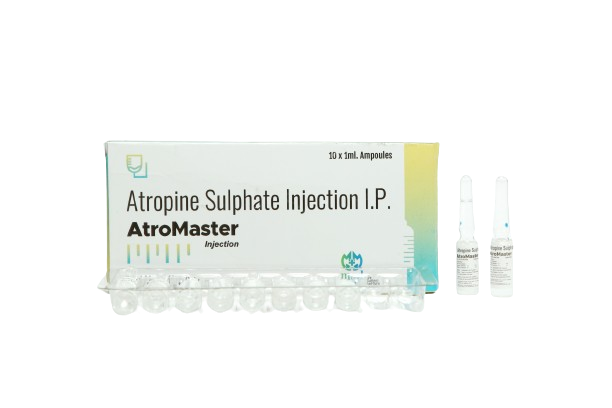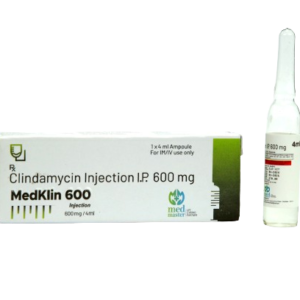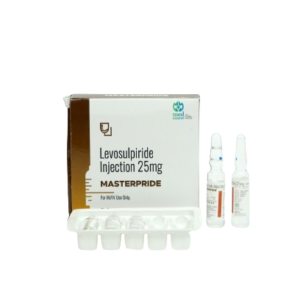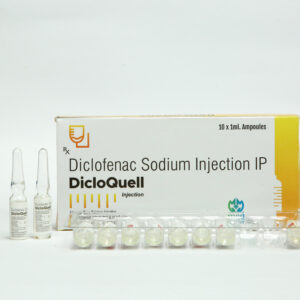Product Composition:
Each vial contains:
- Atropine Sulphate BP (equivalent to Atropine) – 0.6 mg
- Injection – 1 ml
Atropine Sulphate Injection helps to cure bradycardia (slow heart rate). It helps the heart beat normally when the heart is working properly. Massage is also given before general anaesthesia to reduce bone loss. It also acts as an antidote to certain pesticide poisons.
Atropine Sulphate Injection and other agents can be used to reverse the effects of muscle relaxation during surgery. It is administered by your doctor or nurse who will make sure you get the correct dosage. Tell your doctor about all other medications as some are affected by, or may be affected by, these medications.
Benefits of Atropine Sulphate Injection
Atropine Sulphate Injection helps to restore blood pressure to normal. It calms the heart, treats bradycardia and prevents sudden drops in blood pressure or severe complications that would be caused by low blood pressure and is administered by a doctor or nurse as an injection in the hospital. It should not be for personal use. Follow your physician’s direction carefully for maximum benefits.
How Does Atropine Sulphate Injection Work?
Atropine Sulphate injection is an anticholinergic agent. It works by stopping the action of the drug receptor (acetylcholine). This drug dries mucus from the tissues (saliva, sweat, etc.) before surgery, decreases heart rate, and decreases bowel movements (constipation) It also acts as an antidote to certain toxins, and converts drug side effects of some muscle relaxants.
Side Effects of Atropine Sulphate
- Constipation
- Bloating
- Stomach pain
- Nausea
- Vomiting
- Dry eyes
- Blurred vision
- Dry mouth
- Fast/pounding heartbeat,
- Flushing (sudden warmth, redness, or tingly feeling)
- Confusion
- Headache
- Dizziness
- Drowsiness
- Thirst
Precautions
- It is recommended that you avoid alcohol when using this product as alcohol can worsen your health condition.
- Never exceed the recommended dosage and limit the dosage to the lower side or as directed by a health professional.
- Use Amikacin Sulphate as long as it is prescribed by a healthcare professional.
- Do not apply this product as it can cause unwanted side effects such as localization, redness, swelling, pain, inflammation, and much more.
Frequently Asked Questions(FAQ)
Q. What happens if I take an Atropine Sulphate Injection in excess dose?
Some signs of overdose are dilated eyes, difficulty swallowing, burning hot skin, blood loss, inability to pass urine, rapid breathing, increased heart rate and hyperactivity but this rarely occurs when Atropine Sulphate injection is given under the supervision of a trained physician. If you think you have been given too much of this medicine, you should tell your doctor immediately.
Q. What should I avoid during the course of Atropine Sulphate Injection?
Avoid overheating or dehydration during exercise and in hot weather. Atropine Sulphate Injection can reduce sweating and increase itching. Drink plenty of water to prevent dehydration.
Q. Can pregnant women use Atropine Sulphate Injection?
No, Atropine Sulphate Injection should not be given during pregnancy as the drug can cross the placental barrier and cause tachycardia (rapid heartbeat) in the baby.
Q. What is the use of Atropine Sulphate Injection?
Atropine Sulfate 0.6 mg Injection 1 ml Includes a class of drugs known as ‘anticholinergics’, It is used to cure bradycardia (decreased heart rate) to normalize heart rate during cardiac arrest. It is also used to decrease saliva, mucus and other respiratory secretions during surgery. Moreover, it is used as a treatment for organophosphate insecticides, root gas or mushroom poisoning.








